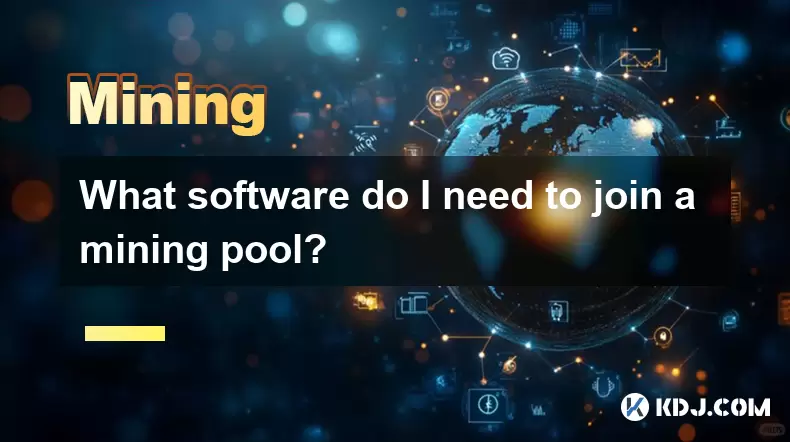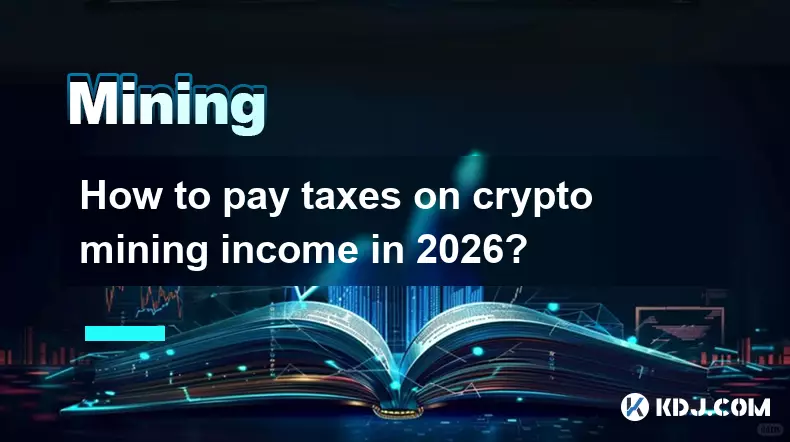-
 bitcoin
bitcoin $87959.907984 USD
1.34% -
 ethereum
ethereum $2920.497338 USD
3.04% -
 tether
tether $0.999775 USD
0.00% -
 xrp
xrp $2.237324 USD
8.12% -
 bnb
bnb $860.243768 USD
0.90% -
 solana
solana $138.089498 USD
5.43% -
 usd-coin
usd-coin $0.999807 USD
0.01% -
 tron
tron $0.272801 USD
-1.53% -
 dogecoin
dogecoin $0.150904 USD
2.96% -
 cardano
cardano $0.421635 USD
1.97% -
 hyperliquid
hyperliquid $32.152445 USD
2.23% -
 bitcoin-cash
bitcoin-cash $533.301069 USD
-1.94% -
 chainlink
chainlink $12.953417 USD
2.68% -
 unus-sed-leo
unus-sed-leo $9.535951 USD
0.73% -
 zcash
zcash $521.483386 USD
-2.87%
What software do I need to join a mining pool?
To mine effectively, choose compatible software, set up a secure wallet, and connect to a reliable mining pool with correct configuration details.
Jul 05, 2025 at 07:32 pm

Understanding Mining Pools and Their Requirements
Joining a mining pool is an essential step for many cryptocurrency miners who want to increase their chances of earning block rewards. Unlike solo mining, where you attempt to mine blocks alone, a mining pool allows multiple miners to combine their computational resources to solve blocks more consistently. However, before you can join a mining pool, you must ensure that you have the appropriate software tools in place.
The primary types of software required include mining software, wallet software, and optionally monitoring or management tools. Each plays a specific role in ensuring your mining operation runs smoothly and securely.
Selecting the Right Mining Software
Mining software acts as the bridge between your hardware (GPU, ASIC, or CPU) and the mining pool. The type of software you choose depends heavily on the hardware you are using and the cryptocurrency you're mining.
- For ASIC miners, popular choices include CGMiner and BFGMiner, both of which support a wide range of ASIC devices.
- If you're using GPU-based mining rigs, especially with AMD or NVIDIA graphics cards, NiceHash Miner, Claymore’s Dual Miner, or PhoenixMiner are widely used.
- For CPU mining, XMRig is one of the most recommended open-source options, particularly for mining Monero (XMR).
Each of these programs requires configuration to connect to your chosen mining pool. Configuration typically involves specifying the pool address, port number, username, and sometimes a password.
Setting Up a Cryptocurrency Wallet
Before connecting to a mining pool, it's crucial to have a digital wallet ready to receive your mined coins. Mining pools do not store your earnings; instead, they periodically send payouts to the wallet address you specify during setup.
You can use either a software wallet or a hardware wallet depending on your security preferences:
- Software wallets like Electrum (for Bitcoin) or Monero GUI Wallet offer ease of use and quick setup.
- Hardware wallets such as Ledger Nano S/X or Trezor Model T provide enhanced security by keeping your private keys offline.
When setting up your wallet, make sure to back up your seed phrase securely and never share it with anyone. You will need your public wallet address when configuring your mining software to point to the correct payout destination.
Choosing a Mining Pool and Configuring Connection Details
Once your mining software and wallet are set up, the next step is to select a reliable mining pool. Factors to consider include pool size, fee structure, payout methods, and server locations.
Some popular mining pools include:
- F2Pool
- Slush Pool
- AntPool
- Hiveon Pool
- NanoPool
After selecting a pool, register an account and create a worker. A worker is essentially a label for your mining rig within the pool, allowing you to monitor its performance individually. You’ll then configure your mining software with the following details:
- Pool URL: This is usually provided in the form of stratum+tcp://pool.example.com:port
- Worker Name: Typically formatted as username.workername
- Password: Often left blank or set to a default value like 'x'
Make sure all these fields are entered correctly in your mining software’s configuration file or command-line arguments.
Monitoring and Managing Your Mining Operation
To maintain optimal performance and track your mining statistics, you may want to use mining monitoring tools. These tools allow you to keep an eye on hashrate, uptime, accepted shares, and potential errors.
- Minerstat: Offers real-time dashboard tracking and remote management capabilities.
- Awesome Miner: Provides centralized control over multiple mining rigs and supports various mining software.
- SimpleMining OS or HiveOS: These are specialized operating systems designed for mining farms, offering built-in monitoring, overclocking features, and API integrations.
These tools often require installation and integration with your existing mining setup. They also provide dashboards where you can view detailed reports and manage configurations remotely.
Frequently Asked Questions
Q1: Can I switch mining pools without changing my mining software?Yes, you can switch pools by simply updating the connection parameters (pool address, port, username, password) in your current mining software configuration. No need to reinstall or change the software unless compatibility issues arise.
Q2: Do I need different mining software for different cryptocurrencies?In many cases, yes. Different algorithms (e.g., SHA-256 for Bitcoin, RandomX for Monero) require compatible mining software. Some programs like NiceHash allow algorithm switching automatically based on profitability, but others are optimized for specific algorithms only.
Q3: Is it safe to use third-party mining software?While many reputable mining software options exist, always download from official sources to avoid malware. Check community forums and GitHub repositories for reviews and updates before installing any mining tool.
Q4: How do I know if my mining software is properly connected to the pool?Most mining software displays logs showing connection status, accepted shares, and rejected shares. Additionally, your mining pool’s dashboard should reflect your miner’s activity, including current hashrate and recent submissions.
Disclaimer:info@kdj.com
The information provided is not trading advice. kdj.com does not assume any responsibility for any investments made based on the information provided in this article. Cryptocurrencies are highly volatile and it is highly recommended that you invest with caution after thorough research!
If you believe that the content used on this website infringes your copyright, please contact us immediately (info@kdj.com) and we will delete it promptly.
- DeepSnitch AI Ignites Crypto Presale Frenzy with Potential 100x Gains Amidst Market Volatility
- 2026-02-09 06:40:01
- Big Game Kickoff: BetMGM Deals $1,500 Bonus for Coin Toss Betting Thrills
- 2026-02-09 07:15:01
- Bitcoin's Rollercoaster: Navigating FOMO, Opportunity, and the Ever-Present Trap
- 2026-02-09 07:10:01
- The Super Bowl Coin Toss: A Flip of Fate, A Bet of Billions, and the Enduring Allure of Heads or Tails
- 2026-02-09 07:10:01
- XRP's High-Stakes Horizon: Charting a Breakout While Dodging Rug Pull Worries
- 2026-02-09 07:05:01
- Massive Token Unlocks Set to Shake Altcoins Amidst Market Volatility
- 2026-02-09 07:05:01
Related knowledge

How to mine crypto sustainably in 2026?
Feb 07,2026 at 04:20pm
Energy Source Optimization1. Miners increasingly deploy solar arrays directly on warehouse rooftops to power ASIC rigs during daylight hours. 2. Geoth...

How to mine Conflux on a standard gaming laptop?
Feb 07,2026 at 04:19am
Hardware Requirements for Conflux Mining1. Conflux uses a proof-of-work consensus mechanism called Tree-Graph, which is designed to be ASIC-resistant ...

How to buy hashing power on cloud mining platforms?
Feb 08,2026 at 05:59pm
Understanding Cloud Mining Contracts1. Cloud mining platforms offer users the ability to rent hashing power without owning or maintaining physical har...

How to mine Flux with a 30-series Nvidia GPU?
Feb 07,2026 at 02:40pm
Market Volatility Patterns1. Bitcoin price movements often exhibit sharp intraday swings exceeding 5% during low-liquidity windows, particularly betwe...

How to pay taxes on crypto mining income in 2026?
Feb 07,2026 at 01:20am
Tax Classification of Mining Rewards1. Cryptocurrency received as mining rewards is treated as ordinary income by most major tax jurisdictions includi...

How to find the lowest fee mining pools for BTC?
Feb 07,2026 at 01:00pm
Fee Structure Transparency1. Most reputable BTC mining pools publish their fee schedules directly on their official websites, often under sections lab...

How to mine crypto sustainably in 2026?
Feb 07,2026 at 04:20pm
Energy Source Optimization1. Miners increasingly deploy solar arrays directly on warehouse rooftops to power ASIC rigs during daylight hours. 2. Geoth...

How to mine Conflux on a standard gaming laptop?
Feb 07,2026 at 04:19am
Hardware Requirements for Conflux Mining1. Conflux uses a proof-of-work consensus mechanism called Tree-Graph, which is designed to be ASIC-resistant ...

How to buy hashing power on cloud mining platforms?
Feb 08,2026 at 05:59pm
Understanding Cloud Mining Contracts1. Cloud mining platforms offer users the ability to rent hashing power without owning or maintaining physical har...

How to mine Flux with a 30-series Nvidia GPU?
Feb 07,2026 at 02:40pm
Market Volatility Patterns1. Bitcoin price movements often exhibit sharp intraday swings exceeding 5% during low-liquidity windows, particularly betwe...

How to pay taxes on crypto mining income in 2026?
Feb 07,2026 at 01:20am
Tax Classification of Mining Rewards1. Cryptocurrency received as mining rewards is treated as ordinary income by most major tax jurisdictions includi...

How to find the lowest fee mining pools for BTC?
Feb 07,2026 at 01:00pm
Fee Structure Transparency1. Most reputable BTC mining pools publish their fee schedules directly on their official websites, often under sections lab...
See all articles





















![Is This a REAL Reversal or Fake out?? I wouldn't Get Excited Just Yet... [20 Min emergency stream] Is This a REAL Reversal or Fake out?? I wouldn't Get Excited Just Yet... [20 Min emergency stream]](/uploads/2026/02/08/cryptocurrencies-news/videos/origin_698897450a654_image_500_375.webp)


![Mesocosmos (By Biskotos) [All Coins] | Geometry Dash Mesocosmos (By Biskotos) [All Coins] | Geometry Dash](/uploads/2026/02/08/cryptocurrencies-news/videos/origin_69889be2eac64_image_500_375.webp)

















































